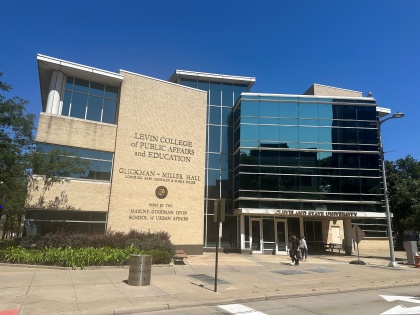Find Your Program
With over 175 career-building programs available, we make achieving your goals more accessible. Search our wide range of programs below to find the bachelor’s or master’s degree, certificate, minor or accelerated program that best fits your needs.
Criminology and Journalism, BA (Journalism)
Criminology and Journalism, BA (Journalism)
Format: On Campus
With a clear parallel between the work of the investigative journalist and the criminologist, a combination of classes in the two fields provides students both the knowledge about longstanding societal problems and the skills to do something about them, and robust opportunities for immediate employment or graduate training. This degree brings together the analytic and public policy-oriented study of crime and its related fields, with the communication-oriented theory, history and skills of journalism.
Criminology Minor
Criminology Minor
Format: On Campus
Expand your understanding of the causes, consequences and responses to crime to gain insights into the criminal justice system and societal issues related to law enforcement and crime prevention. This minor can open opportunities for careers in criminal justice agencies, law enforcement, social services and legal professions, as well as further study in criminology or related fields. The minor consists of 21 credit hours.
Criminology, BA
Criminology, BA
Format: On Campus
Deepen your understanding of crime, criminal justice and the sociological factors that contribute to criminal behavior. Tailor your education to align with your interests with a wide selection of comprehensive electives. You???ll also have the chance to engage in internships and the Honors Program, which involves advanced research and presenting a research paper at a professional meeting.
Culture, Communication, and Health Care, Graduate Certificate
Culture, Communication, and Health Care, Graduate Certificate
Format: On Campus
Explore the critical role of culture and communication in the delivery of quality health care. Choose from a variety of courses to develop your cognitive framework and enhance your skills in your area of interest. The certificate program consists of 12+ credit hours, depending on elective course choice.
Culture, Communication, and Health Certificate
Culture, Communication, and Health Certificate
Format: On Campus
Examine the multiple ways that culture and societal institutions influence the communication (and miscommunication) of health information within an administrative or service delivery context, and how to proactively break down these barriers for a diverse population. The program consists of six credits of core courses in health sciences and communication, nine credits of electives, and a 2-3 credit internship/cooperative education experience.
Take Action
Latest Headlines

Student of Distinction: Kelly Fanger

Textbook Affordability the Mission of CSU’s Goodsett

AI Symposium Returns to CSU

Register for Our Graduate Networking Social










